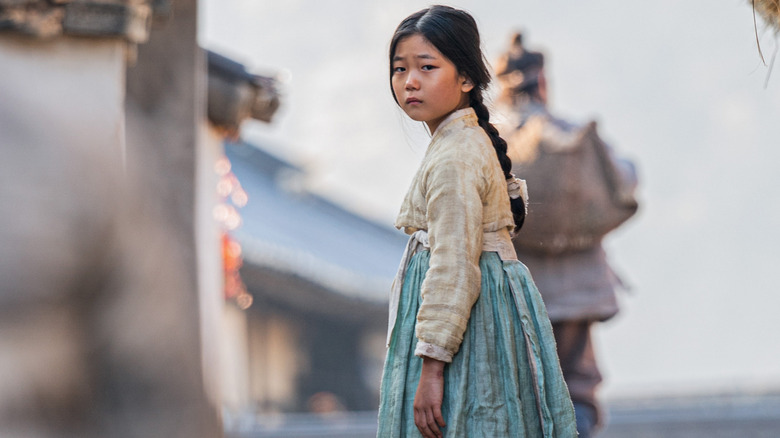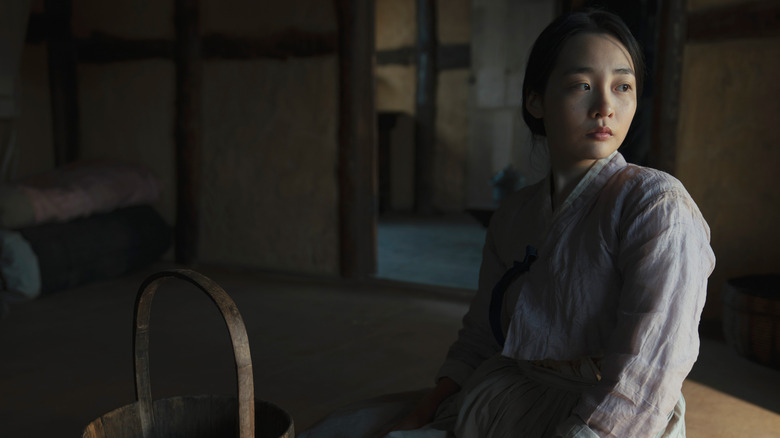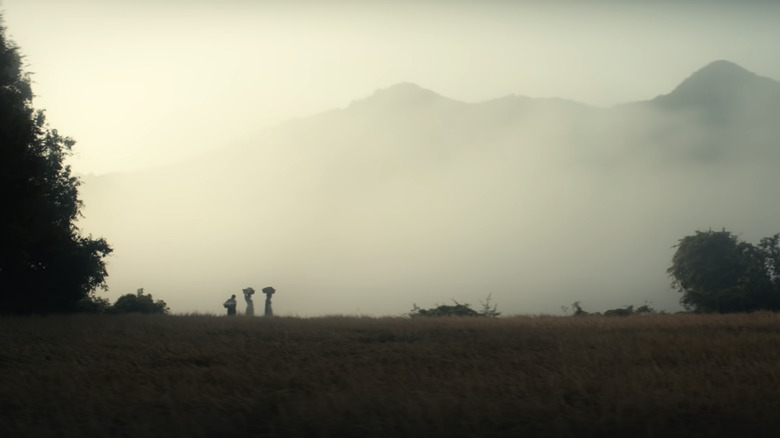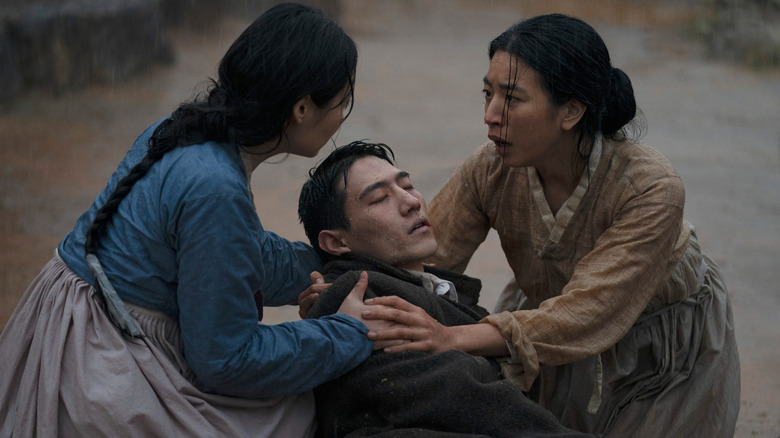Pachinko EPs Wanted To Give An Intimate Immigrant Saga The Prestige TV Treatment [Interview]
More often than not, immigrant tales arrive to our screens as intimate portrayals of strength, zoomed in on their lead characters for small-scale exploration. This is not entirely untrue of "Pachinko," the new Apple TV+ series based on the Min Jin Lee novel of the same name: It traces the journey of a single family through time, chronicling the hopes and dreams across four generations as they journey from Korea to Japan to America across more than 70 years. But despite that laser-focus, there's an epic breadth to this saga, which takes as much time to highlight the fine, textural details of Korean culture as it does the grand scope of their lives.
According to executive producers Theresa Kang and Michael Ellenberg, this was always part of the plan. "Pachinko" was an exceedingly ambitious project from the very start because, in their eyes, "This story deserved the same treatment as any big American series you might see and should have the same sumptuous production values as 'The Crown,' as 'The Gilded Age.'" The series filmed in multiple locations across Japan, Vancouver, Canada, and seven Korean cities, which goes a long way in highlighting the momentous nature of the events that impacted this single family. As Ellenberg notes in our conversation, the specificity of "Pachinko" makes it universally personal: "These are the journeys that led us to the moments we're in right now. And if you could look at any of our families backwards in time, you would see similarities."
This eight-episode saga is told through the eyes of the remarkable matriarch Sunja (played in different eras by Yu-na Jeon, Minha Kim, and Youh Yuh-jung), who triumphs against all odds and carves out a future for her family. The series juxtaposes her story with that of her grandson, who struggles to find his own path forward. In the below conversation, EPs Ellenberg and Kang unpack what drew them to the series and how that heart guided their approach to production.
This interview has been lightly edited for clarity and length.
'By being so specific, [it] was universal'
What drew you both to the story of "Pachinko" — and if you read the book first, what drew you to the adaptation?
Ellenberg: We both read the book first and fell in love with it. For me, personally, it's an incredible novel and an incredible epic saga. And on a personal level, I think what attracted me and us to it, this incredibly specific immigrant saga, was that by being so specific, [it] was universal. For me, personally, my father was born in Nazi Germany in 1935. He and his family fled in 1939. They went to Panama for two years before coming to the United States. And by the early '60s, he was stationed in Korea, actually, as a Captain in the U.S. Army. You grew up with these kinds of stories and they become almost abstract, right? It's hard to really see them as a real thing. And so you read this novel and the weight of that experience sort of sprung up in me, and it felt if it had this big impact on me, it could have an impact on so many people around the world.
We were also mindful ... this is before "Parasite." "Crazy Rich Asians" was, I think, eight months away. But K-dramas were gigantic, and Korean cinema was incredible and had been incredible for a couple decades already at that point. So it felt like there was a unique moment where you could build this show authentically and truthfully, and it would speak to the world. But we were only going to take it on if we had a showrunner who both had the creative capability of adapting this ambitious work, and also the cultural competency to do it authentically. And so I was fortunate: Theresa and I were working together, and then when Theresa called and said, "Soo Hugh wants to do this," I sat down with Soo to hear her vision [as showrunner]. I also met Soo as a person. That was the moment we all knew we could go forward confidently and do this and do right by this material.
Kang: And for me personally, it goes a little bit further back. At UCLA, I studied Asian American Studies and Anthropology, and I wrote a paper about Koreans living in Japan. It's really something I didn't know about. I didn't realize that the Korean diaspora extended beyond the U.S. and a few other countries. And I feel like this is a history that many people may not know about, Japanese occupation of Korea. Underneath it, it's really a story about one family. It's about the sacrifices that one generation makes for the next. Whether you're Korean or not, though, I feel it's incredibly universal, because it really is about family. Soo coined this phrase, "There's a Sunja in every family." And I think that is something, as an audience, we'll find some kind of recognition in.
But long-winded way of answering your question, when I first heard about the book, it was only the second time I'd heard about Koreans living in Japan. The book was incredible, and turning it into a visual language ... as Michael mentioned, I represented and worked with Soo Hugh, and she had this great vision for it. And over time, we had amazing directors, we have a stunning cast. I feel every single person that worked on it has a passion for it. And I hope you feel that from the screen.
'We often talked about 'The Godfather,' a similar multi-generational epic'
I like that you both returned to this idea of "Pachinko" being about one single family and also telling a story that's extremely universal. In terms of scope, there's a feeling of this being very personal but also big and sprawling. What were the conversations like with your directors and with your showrunner to bring that out?
Kang: I'll make one comment. We talked about a lot of comps. Soo was thinking about many things. We often talked about "The Godfather," a similar multi-generational epic. And when I first watched that movie as a kid, not being part of an Italian family, I immediately connected to it. And I think that's a similar feeling that one might get from watching "Pachinko."
Ellenberg: Yeah. And I'll just add to that. Aesthetically, there was an ambition. These epic stories, when you watch them as films, they can seem different, right? Meaning, they're not your own experience. And the reality is, all of us have — these are the journeys that led us to the moments we're in right now. And if you could look at any of our families backwards in time, you would see similarities, right? Soo had this wildly ambitious idea, which was "The Godfather II," of past and present being interlinked, right? And so it was our ambition at the time, and maybe Theresa and I were the only two people in Hollywood who believed you could pull it off, which was, to do this at scale. That this story deserved the same treatment as any big American series you might see and should have the same sumptuous production values as "The Crown," as "The Gilded Age," and transport you.
We wanted you to be able to really go through what the characters went through, and that meant seeing the environments and the worlds they were in. And to the greatest extent possible, recreating those. [Directors] Kogonada and Justin [Chon] did an incredible job under incredibly difficult circumstances, and they were inspired by the ambition of it. And Soo, she had done "The Terror" before. She loves movies and she loves production and wanted this to be something that was both incredibly impactful emotionally, but also just a rich cinematic experience as well.
Kang: And our cast is amazing. We have a global cast from Korea, Japan, Canada, U.S., all over the world. And that was something that was not easy to achieve. But it took the hard work of so many people and we have this amazing cast. So we're very excited about that as well.
'There are a lot of these barriers that people say audiences have, but haven't really challenged'
Along with that idea of there being a right moment in time, it also feels like we're moving away from the language barrier of American audiences shying away from subtitles.
Kang: Absolutely. I often think about, in terms of taking on projects, taking something that is considered foreign and making it feel familiar. I think we've achieved that with "Pachinko," in that when you first hear about it, you think about Asian family, period piece. But when you see the series, it transports you to another time and it feels incredibly contemporary and timeless. At the end of the day, it's really about how we're connected to one another. And what's more universal than emotion and feeling connected to one's family? So we're really hoping that no matter where you come from, you have Sunja in your family. That's what Soo would always talk about. This show is universal in that there is a woman like a Sunja in every family.
Ellenberg: On the foreign language, we want that to be a feature, not a bug. Meaning, the reason to watch the show is also, it's authentic. It's a world you're transported to. So if you speak Korean, if you're from Korea or you're in Korea now, you'll have obviously a more immediate resonance. But for those who aren't or don't speak the language, we want every piece of this to feel authentic. And it's a world you can live in and be in authentically.
We had consultants and historians look at every thread of this show, both in the writers' room, on the cuts, on set, to make sure it's as accurate as possible. So I think for American audiences ... my mom loves K-drama, right? And K-dramas, by the way, well before us, have been incredibly successful globally. I think it's why it's such an exciting time to be doing what we do. There are a lot of these barriers that people say audiences have, but haven't really challenged to see how real they are. So we're hopeful and optimistic that audiences will come and see this and embrace it.
Kang: I also think for Soo ... Soo's family owned a chain of Korean language video stores. My father owned a chain of video stores with English language and a huge robust international film section. And I think growing up, for us — definitely for myself — I felt very entitled to my Americanness. But in my home, we spoke Korean. And my parents wouldn't respond to my sister and I unless we spoke to them in Korean. So for me, subtitles was a normal thing. That was my everyday existence. Being involved in this project as a producer, it's a little bit of the same mentality. Which is, we can tell these stories in whatever language it needs to be told, whatever is really authentic to that story, to that character. And that's what we did.
The first three episodes of "Pachinko" are now available to stream on Apple TV+, with new episodes debuting weekly on Fridays.



